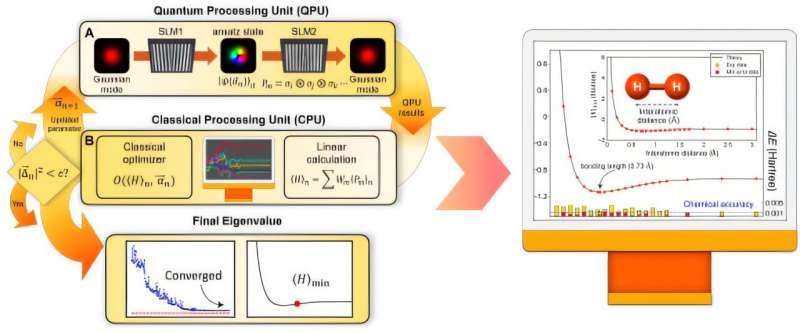
November 21, 2024 by National Research Council of Science and Technology
Collected at: https://phys.org/news/2024-11-photon-qubits-ai-enabling-accurate.html
In an era where AI and data are driving the scientific revolution, quantum computing technology is emerging as another game-changer in the development of new drugs and new materials.
Dr. Hyang-Tag Lim’s research team at the Center for Quantum Technology at the Korea Institute of Science and Technology (KIST) has implemented a quantum computing algorithm that can estimate interatomic bond distances and ground state energies with chemical accuracy using fewer resources than conventional methods, and has succeeded in performing accurate calculations without the need for additional quantum error mitigation techniques.
The work is published in the journal Science Advances.
Quantum computers have the disadvantage of rapidly increasing errors as the computational space grows at the current level. To overcome this, the Variational Quantum Eigensolver (VQE) method, which combines the advantages of classical and quantum computers, has emerged.
VQE is a hybrid algorithm designed to use a Quantum Processing Unit (QPU) and a Classical Processing Unit (CPU) together to perform faster computations.
Global research teams, including IBM and Google, are investigating it in a variety of quantum systems, including superconducting and trapped-ion systems. However, qubit-based VQE is currently only implemented up to 2 qubits in photonic systems and 12 qubits in superconducting systems, and is challenged by error issues that make it difficult to scale when more qubits and complex computations are required.

Instead of qubits, the team utilized a higher-dimensional form of quantum information called a qudit. A qudit is a quantum unit that can have multiple states, including 0, 1, and 2, in addition to the 0 and 1 that a traditional qubit can represent, which is advantageous for complex quantum computations.
In this study, a qudit was implemented by the orbital angular momentum state of a single-photon, and dimensional expansion was possible by adjusting the phase of a photon through holographic images. This allowed for high-dimensional calculations without complex quantum gates, reducing errors.
The team used the method to perform quantum chemistry calculations with VQE to estimate the bond length between hydrogen molecules in four dimensions and lithium hydride (LiH) molecules in 16 dimensions, the first time 16-dimensional calculations have been realized in photonic systems.
While conventional VQEs from IBM, Google, and others are required error mitigation techniques for chemical accuracy, the KIST team’s VQE achieved chemical accuracy without any error mitigation techniques. This demonstrates how high accuracy can be achieved with fewer resources, showing the potential for widespread application in industries where molecular properties are important. It is also expected to be useful in solving complex problems such as climate modeling.
“By securing qudit-based quantum computing technology that can achieve chemical accuracy with fewer resources, we expect it to be used in various practical fields, such as developing new drugs and improving battery performance,” said Dr. Hyang-Tag Lim of KIST.
More information: Byungjoo Kim et al, Qudit-based variational quantum eigensolver using photonic orbital angular momentum states, Science Advances (2024). DOI: 10.1126/sciadv.ado3472
Journal information: Science Advances

Leave a Reply